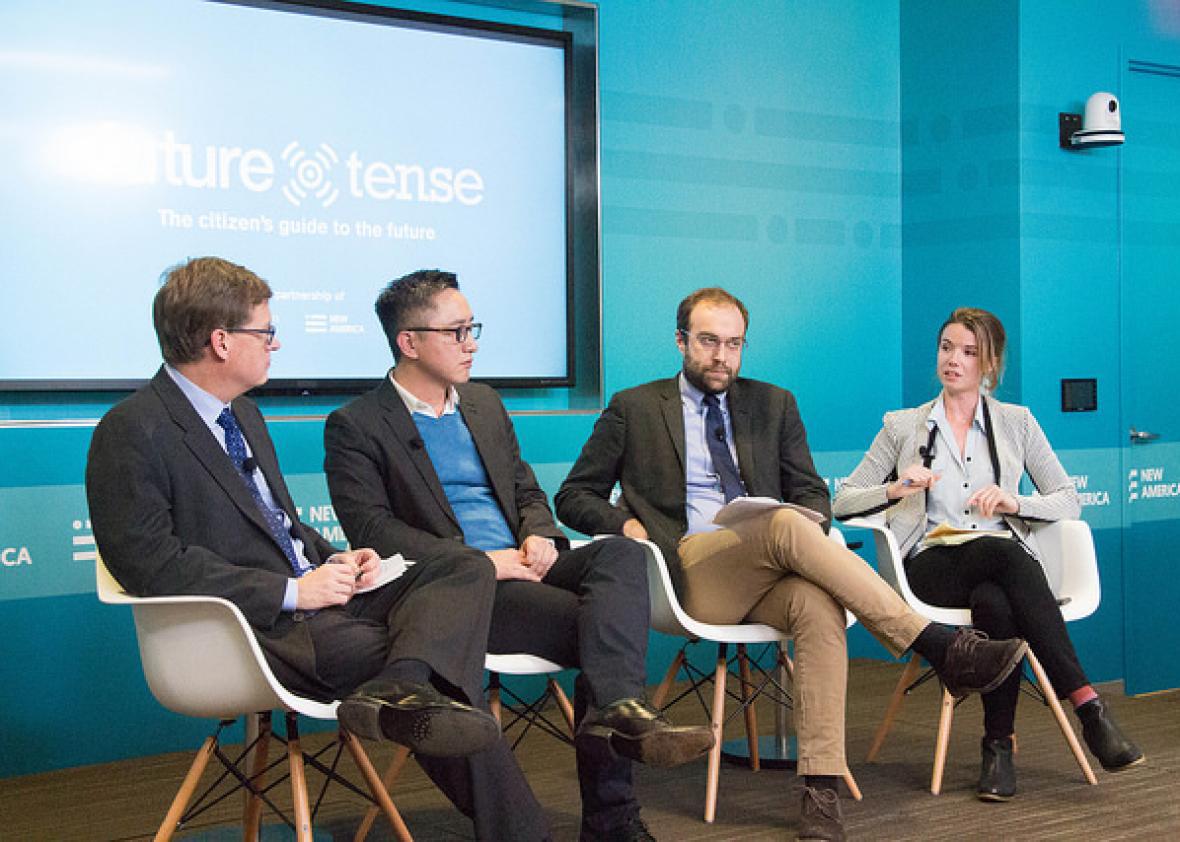The internet’s gotten a bad rap lately. Because of the internet, a recent study suggests, students struggle to tell fact from fiction. Recently, in the New York Times, Timothy Egan argued that the internet is responsible for shrinking attention spans that have, in turn, given rise to a culture that needs constant stimulation in the form of hyper-paced TV shows and presidential elections. And our first social media president told us in his farewell speech to stop arguing with strangers on the internet and talk to them in real life.
It’s hard to remember that just a few years ago, people largely saw the internet as the embodiment of openness and freedom—American ideals. We saw that rhetoric in 2011 during Arab Spring, when Twitter was the tool of choice for revolutionaries. We saw it when Google moved back into China. But at “Will the Internet Always Be American?”, a Future Tense event held in Washington on Jan. 24, the first thing we heard was a debunking of that sunny rhetoric.
Rebecca MacKinnon, author of Consent of the Networked: The Worldwide Struggle for Internet Freedom and director of the Ranking Digital Rights program at New America, kicked off the discussion. She observed that in the early days of the internet, there was an assumption that it was inherently a liberating force. The formula was easy: Take authoritarian state, add internet, get democracy. But that formula failed to account for the idea that authoritarian regimes could adapt and in fact thrive in the Internet Age. MacKinnon pointed to Russia under Putin as an example of a country skilled in what she calls “digital bonapartism”— an offshoot of a Marxist concept that was used to describe political leadership by a populist demagogue who seeks to legitimize himself through democratic rhetoric. The theory goes that leaders of authoritarian regimes like Russia and China permit access to digital tools (at least some of them) and use the rhetoric of free speech, even while they attack dissenters through campaigns of misinformation, surveillance, censorship, and targeted online harassment.
However, Emily Parker, a Future Tense fellow and author of Now I Know Who My Comrades Are: Voices From the Internet Underground, warned that a fatalistic view of the internet was misguided, too. “So much of it is about expectations. Anyone who thought the internet was going to unseat the Chinese government? That’s a problematic assumption,” she said. “I still say that the internet has transformed China. The degree of news that Chinese citizens can get that they weren’t able to get access to before” is impressive.
The event also addressed other ways that the diffuse nature of the internet clashes with governments. For instance: Who has sovereignty over the cloud? And how should U.S.-based tech companies operate within the borders of other countries? What is their corporate responsibility to human rights, and how do they define human rights? There’s no existing legal framework for these companies in the U.S., let alone the rest of the world.
Carolyn Nguyen, Microsoft’s director of technology policy, described the tension between the need to respect national sovereignty and the utopian idea of a borderless cloud. No one would know that tension better than Microsoft, which according to Nguyen, has sued the U.S. government four times over privacy and transparency rights.
A recent case highlights the gray area that exists when the cloud bumps up against national borders. In 2014, the Department of Justice issued what seemed to be a cut-and-dry warrant requesting emails and other personal data for a suspect. Microsoft resisted, arguing that since the data was stored in one of its Irish data centers, it didn’t have to comply with a domestic search warrant. Jennifer Daskal, an American University law professor, explained that mutual legal assistance treaties, or MLATs, already provide a means for countries to work together on information gathering for law enforcement. (She recently wrote about the case for Future Tense.) Microsoft felt the DOJ should use that mechanism to seek the information in the company’s Irish data center, and in 2016, the 2nd Circuit Appeals Court agreed.
Thanks to the Microsoft case, data is now legally tied to its physical location. That’s tricky for several reasons. As Ross Schulman, co-director of the Cybersecurity Initiative at New America described, it’s ridiculously easy to bounce data around the globe. Google, for example, will move your data to the server closest to your physical location. And if data is tied to its physical location, and it’s currently in a country whose local privacy laws aren’t as protective as the United States’ it would actually be easier for the U.S. government to draw up a MLAT then go through American due process.
The significance of an increasingly localized digital space was driven home when moderator Andrés Martinez, who is editorial director of Future Tense, asked the panelists whether countries might retreat into their own Balkanized internets. Could—or should—an American internet look and behave differently than a Chinese one? Hao Wu, filmmaker and fellow at New America, suggested that a customized digital experience made a lot of sense from a business perspective. And some countries have bristled at the idea of American-imposed values dominating the internet. Joshua Keating, a staff writer at Slate, said those values of freedom and openness, predicated on the moral authority of America, were damaged by the revelation of government-sponsored systems of surveillance. “[W]e’ve gone from this idea of the internet being something that exists separate from nation states and outside of physical space to one that advances territorial claims,” he said.
You can watch the full event on the New America website.
